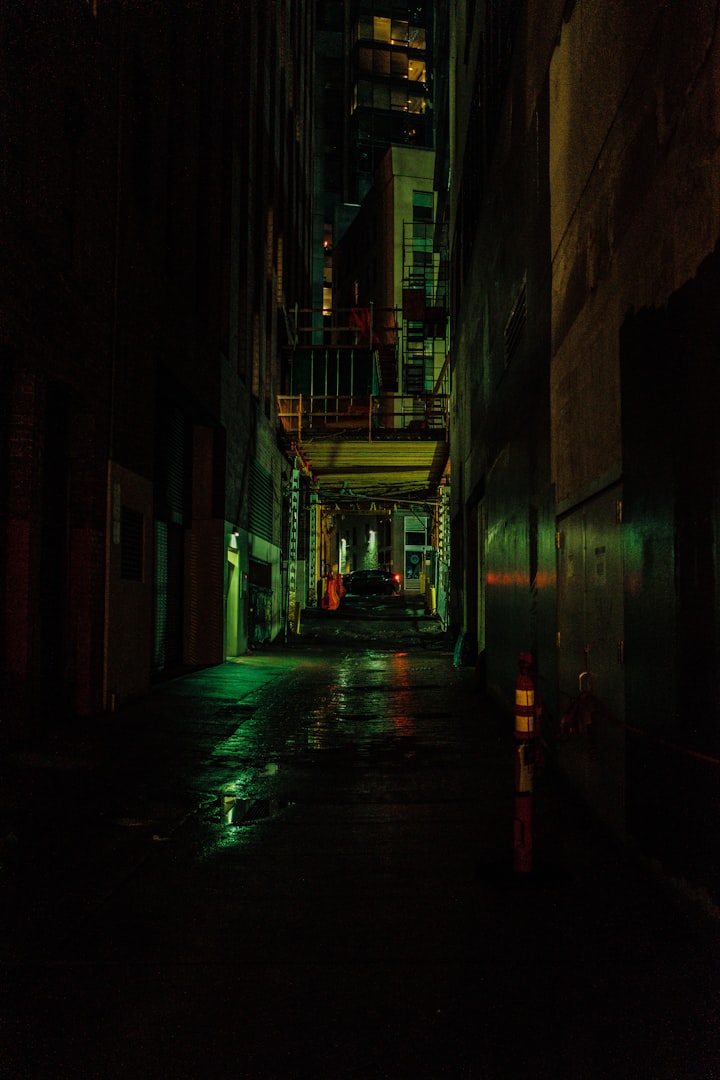Neon Green
The sky isn't what it used to be.
The blanket slumped off the side of the mattress. Sleeping in the house, especially when their old fan was broken, was impossible. Dry dusty heat simmered under the lead-lined ceiling, and Hara felt like a soup ingredient, boiling in a big pot. She was splayed out on the blissfully empty mattress, trying not to think about how little she had slept on her few precious hours off.
She worked on the far side of the city, loading and unloading freeze-dried produce, MREs, and toiletry items for one of the small government-mandated grocery stores. It was manned by an outfit of veterans of the Level War who were older than dirt and about to lie in it. Her job involved long hours under the Sunlights, heavy boxes she had to lift with her knees, and grumpy old geezers who still thought they were running a military operation.
Often, after an hour walk back home, her apartment would be empty. It was a one-room metal box with cracked glass windows and a door that didn’t lock. The only thing that stood between the apartment and the outside was Mom’s ancient heart-shaped locket that functioned as a sliding lock. Once, it had held a picture of Mama, Mom’s wife and Hara’s other adoptive mother, but in the decade since Mama’s death, the picture had faded and flaked. She used to thumb over it, rubbing the details off.
Sometimes, Hara thought that using the necklace as a lock was a way of honoring Mama. She had been the protective sort, always holding the back of Hara’s neck gently like someone might grab Hara if Mama was not touching her. She remembered a little about Mama: her buzzcut, her stout hands. Her face was harder to recollect; in Hara’s precious few memories of her, her features fuzzed and blurred. There were eyebrows and eyes and a nose and a mouth, but the shapes and colors were vague.
Hara closed her eyes and tried to picture Mama’s in sparkling clarity. She saw a muted green that blended into eyelashes and nondescript eyebrows. It was her fault that the picture of her mother was lost to memory, and she sat up suddenly on the bed, scrubbing her face with her hands. Sometimes when it was too hot and she was working too much and her mom and grandmother were at the coal mines, she would stare at the locket and think of the picture and blame herself for Mama’s death. Mama had died in the mines, miles and miles away. Hara knew logically that it could not have been her fault, but misplaced guilt said otherwise.
She stood up. She should head to work early. No use moping around this tiny hot apartment about a mother who couldn’t come back from the dead no matter how much guilt she held in between her ribs.
Hara found her boots by the broken fan and was about to tug them on when she heard a knock on the door. She realized in the beats after the knock that the city had gone silent. There was no hum of the Sunlights, no talking, no moped engines. And then the screaming began.
She wrenched the door open just as the lights in her apartment flickered off. Standing outside, eyes wide in the semi-darkness, was Hara’s friend, Lakshmi. “What the fuck is going—” Hara began.
“Look up,” whispered Lakshmi breathlessly.
So Hara did.
She looked up, craned her neck beyond the doorway, and felt her entire chest seize. Icy crippling fear frosted her veins, and wonder bloomed up her spine. Dark clouds rimmed with neon green rolled across the sky, threaded with yellow lightning. The biosphere’s forcefield had faded, leaving behind a skeleton of wires, scaffolding, and dark Sunlights. In the forcefield’s place was a thunderstorm. A beautiful, dangerous, radioactive thunderstorm. Hara had the awful desire to dance in the coming acid rain. Would it melt her skin? Turn her green? Whatever it would do, she would hardly care.
The sky. The real, actual sky.
“What do we do?” Hara murmured.
The streets turned to chaos. People skittered toward shelter, holding whatever they were carrying above their heads. Mopeds, wheels still spinning, lay overturned on the cracked gravel lane. The emergency siren kicked on, and a robotic voice repeated, “Take shelter. Take shelter.”
“Come on,” said Lakshmi. She took Hara’s hand, and they stepped out together as a great clap of thunder, like the applause of an old forgotten god, shook the city. Lakshmi tugged Hara into a run, and they sprinted down the winding lanes.
Red floodlights burned on every building, flickering like the emergency generators couldn’t power them all at once. Had the storm taken down the forcefield, or had it been someone or several someones? The last few months, a surge of unrest had swept the biosphere. There had been rumors of a demonstration: a group of underground anarchists were planning a march on the sprawling government compound in the northern sector where the biosphere’s central computer was located. Handwritten flyers had been distributed anonymously, declaring that the Radiation Record Agency’s last report on exterior radiation levels were exaggeratedly high. The radiation levels were dropping, according to the flyers, and it was now safe to leave with certain protection that the military had recalled from citizens a few years ago, citing faulty computer chips in standard issue radiation suits and masks.
The message was clear. No one had ventured outside the biosphere except for the miners and a few select groups of RRA scientists in the last century, and the government did not want anyone else to leave whether or not it was safe.
But why? Hara thought. Is there something else out there? What else have they kept from us?
A fork of lightning branched through the biosphere’s wiring, and a shower of sparks rained down, cooling against the slanted rooftops of a row of warehouses. “Why did you come get me?” Hara yelled as the wind picked up, howling down alleys and between the vacuum-packed buildings.
Lakshmi didn’t look back. “There’s a riot at the capital,” she said.
So, the anarchists had gone through with it after all.
“That explains the forcefield,” said Hara.
Another flash of lightning. Another burst of sparks. A few landed on pieces of trash that floated down the narrow streets, and suddenly little fires danced along the cracked concrete. The rain began, slow and drizzly and gray. Fat drops landed on her forehead, her hands, her arms. They did not burn or hurt or fizz, and Hara felt almost disappointed.
By the time they reached the small bar Lakshmi’s father owned, they were out of breath. Chests heaving, they pushed into the bar and closed the door quickly behind them. Four patrons and Lakshmi’s dad stood behind the bar, staring at the fuzzy TV mounted to the wall. Live coverage of the riot was playing. Someone was climbing up the flagpole outside the compound, and a ring of supporters below cheered her on as she reached the flag, grabbed a lighter from her belt, and lit it aflame. The rain was coming down harder there, and she was drenched by the time she slid back down, half-wet half-aflame flag in hand. She held it aloft like a trophy. Lightning split the sky behind her, and thunder spat out another lungful of raindrops.
A group of people came out from the compound. They looked solemn unlike the crowd gathered in the yard, and Hara heard herself gasp. She recognized two of those faces and the grim determination that settled their mouths into hard pressed lines.
“Oh my God,” said Lakshmi. “Hara, oh my God.”
Hara’s mother and grandmother had taken down the forcefield. They had revealed the sky to generations who had never seen it and given everyone the choice to leave. They were some of the only people who had ever left the biosphere. Their personal radiation equipment had been taken away. The miners must have known something about the radiation levels, how the RRA was publishing false information.
“Get out of there,” whispered Lakshmi’s father.
The microphones picked up the helicopters before the cameras saw them. Ten ringed the compound, lights beaming down, pointing right at the group that had come out of the compound. Right at Hara’s mother and grandmother. Someone said over a bullhorn, “Get on your knees and put your hands behind your head. You are under arrest for violation of private property. I repeat, get on your knees and put your hands behind your head. You are under arrest for violation of private property. If you attempt to run, you will be immediately shot.”
It was like Hara’s heart fell out of her body. She couldn’t breathe. She couldn’t think. She couldn’t cry. She could only hear the echo of what the soldier had said, You will be immediately shot.
Shot.
Killed.
Dead.
Hara would be an orphan. She wouldn’t have a mother or a grandmother anymore. She watched in abject horror, waiting. Waiting to see if they ran. They had traded their freedom for everyone else’s. For Hara’s.
Everyone on the ground dropped to the ground except for the girl with the flag. The punctuation of relief in Hara’s stomach mixed with fear. What was that fucking girl doing? She had a goddamn death wish.
The flag was half its original size, the edges singed charcoal black. She raised it high and then dropped in the mud forming on the lawn. She jumped on it, grinding it into the ground and grinned as the soldiers aboard the helicopters opened fire. Her blood mixed with the mud and the grass and the flag. Her body was riddled with bullet holes, fresh and ragged and numerous. She looked like someone had taken a cookie cutter and mistaken her for dough.
Hara choked at the same time that Lakshmi let out a scream that she muffled behind her hand.
The patrons at the bar murmured expletives.
And Lakshmi’s father reached for the TV remote.
“Don’t you fucking dare,” hissed Hara.
Lakshmi’s father blanched and tightened his hands into fists. “You can guess what happens next,” he said in a tight angry voice Hara had never heard before. And she had been around him for most of her life.
Today was nothing if not new.
But the TV stayed on and they all watched as armored vans approached and one by one, each of the protestors were handcuffed and shoved into the back of a van. Nobody covered the girl’s body.
Hara’s mother and grandmother did not look at the cameras nor the soldiers. They stared blankly at the ground. Hara wished she could tell what they were thinking. She wished a lot of things: to hug them one more time, to sleep on their shared mattress in their tiny apartment, to fix their stupid fucking fan and yell at each other because none of them knew how to fix fans. But Hara at least wanted to know if they were scared. Did they regret it? She hoped not.
She couldn’t let their risk go to waste.
The moment the live coverage cut, she stood up. Looked at Lakshmi. Thunder rumbled overhead, and rain lashed at the roof. “Let’s go outside,” she said.
Hara would be damned if she let the only family she had ever known rot in prison for the rest of their lives, and she would be damned if she didn’t burn this fucking biosphere to the ground. But for now, before the forcefield came back up and everyone tried to return to normal, she wanted to dance in the rain and see the neon green sky before the Sunlights rose again.
About the Creator
Brittany MacKeown
I also go by my middle name, Renee, but you can call me about anything







Comments
There are no comments for this story
Be the first to respond and start the conversation.